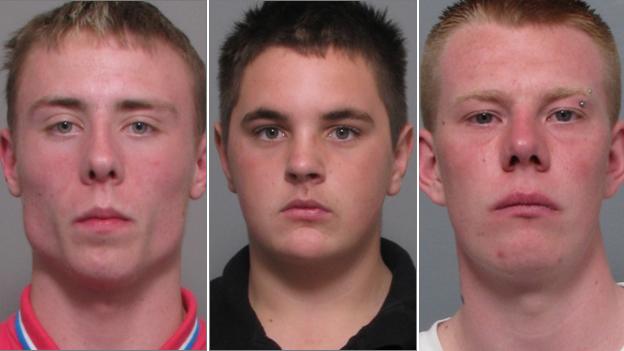Lasers should be classed as offensive weapons - pilots' union
- Published
Jim McAuslan, British Airline Pilots Association: "Make lasers an offensive weapon"
Laser pointers should be classed as "offensive weapons", the British Airline Pilots Association has said.
The call comes after a New York-bound plane was forced to turn back to London Heathrow Airport after a laser beam hit the cockpit after take off, causing a "medical issue" for one of the pilots.
It is illegal to shine a light at a plane "so as to dazzle the pilot", but not an offence to own or carry a laser.
The union says they are "incredibly dangerous", and could blind pilots.
Virgin Atlantic flight VS025 turned back after it was struck by the laser on Sunday evening, about six or seven miles west of Heathrow.
How dangerous are lasers to planes?
'It's only a matter of time until someone dies'
"This is not an isolated incident," British Airline Pilots Association's (Balpa's) general secretary Jim McAuslan said. "Aircraft are attacked with lasers at an alarming rate and with lasers with ever-increasing strength."
A recording of a crew member speaking to air traffic controllers has emerged
"Modern lasers have the power to blind and certainly to act as a huge distraction and to dazzle the pilots during critical phases of flight."
Former pilot and fellow member of the pilot's union Dave Smith said legislation on lasers - first introduced in 2010 - should be much tougher.
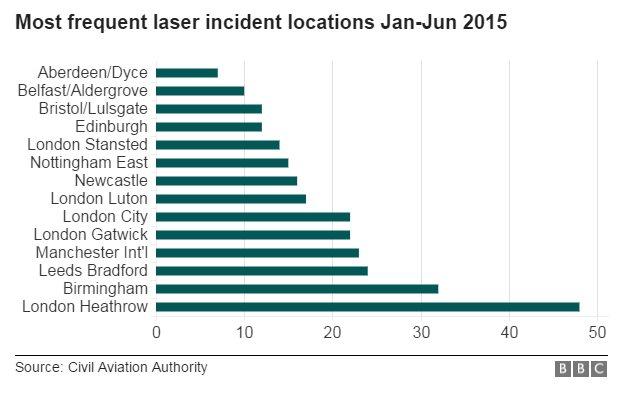
"The law from 2010 is just an offence of shining the laser into the cockpit, but of course that is very difficult to prove," he said.
Balpa is calling for sales of all but the lowest power devices to be regulated.
"Lasers should be specifically included in the offensive weapons legislation so that if someone is found to be carrying a laser without good reason then they are treated in the same way as if they are carrying a knife," a spokeswoman added.
'Over the internet'
But Dr John O'Hagan, a laser safety expert at Public Health England, believes the existing laws are adequate.
"Our recommendation is that only low-powered lasers, one milliwatt - one thousandth of a watt - should be generally available to the public.
"And in the UK now it is relatively unusual to be able to buy a laser, that looks like a laser pointer, that's at a higher power. The trouble is that you can buy them over the internet at much higher powers."
Lasers produce a concentrated, pencil-like beam of light which can be directed over large distances.
They vary in strength and have a wide variety of uses, including CD readers, printers, barcode scanners, presentational aids, DIY alignment tools and medical surgery.
It is the misuse of laser pointers, sometimes referred to as laser pens, which is generating concern.
'Precautionary measure'
Last year, a man who targeted a Police Scotland helicopter with a laser pen was jailed for 12 months after detectives used thermal imaging equipment to locate him.
Craig Ryan, 23, shone the beam at the aircraft from his garden in Stevenston, forcing the pilot to take evasive action.
In 2014 three men from Leicestershire were jailed for using laser pens to dazzle pilots coming in to land at East Midlands Airport.
In one case the pilots' vision was so badly affected that they had to cover the cockpit and land using instruments alone.
The Metropolitan Police has said it is investigating Sunday's incident but there have been no arrests so far.
Virgin Atlantic said the flight returned to the west London airport as a "precautionary measure" after the co-pilot reported feeling unwell.
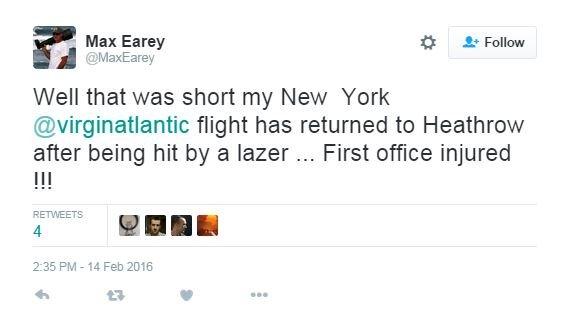
Passengers were grounded overnight and due to board an alternative flight at 13:00 GMT on Monday but some complained about the length of the delay.
Photographer Max Earey tweeted, external: "So the aircraft lands @10.30pm but you can't get me out again until 1pm tomorrow! REALLY @VirginAtlantic I'm losing a whole day of my trip."
But Jessica Moore, who was travelling to New York for a holiday with her boyfriend, said she thought the pilots were right to turn around.
"Many people on the plane were quite worried they weren't telling us the whole truth but I didn't think that was the case," she said.
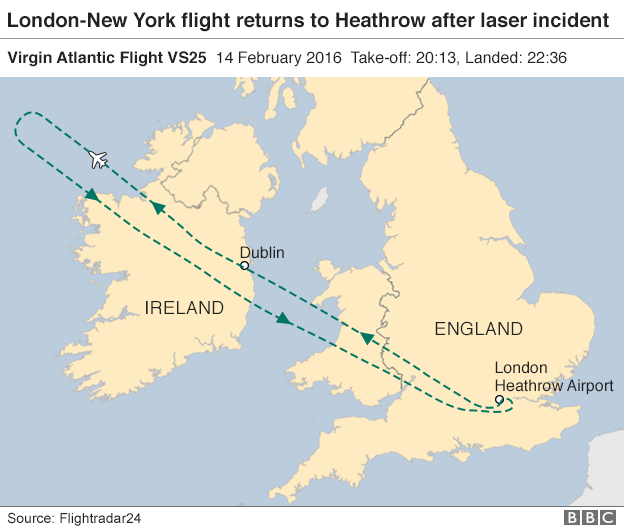
According to Balpa, being hit with a laser can result in temporary vision loss associated with flash blindness; a "visual interference that persists after the source of illumination has been removed".
It can also cause an after-image - an "image left in the visual field after exposure to a bright light" - and glare in the cockpit.
In November 2015 it was reported that the eye of a British Airways pilot was damaged after a "military" strength laser was shone into his aircraft.
One passenger said; ''the pilot was fine, he was calm''
Between January 2009 and June 2015 more than 8,998 laser incidents across the country were reported to the UK Civil Aviation Authority (CAA)., external
In 2014 alone, there were 1,440 reported incidents in the UK. Heathrow had the most, at 168.
Manchester International airport had the second most in that period, with 107, followed by Birmingham airport, with 92, and Leeds Bradford airport, with 81.
In the US, CNN reported, external, there were 20 incidents during one night alone in November last year.
Aviation expert Julian Bray said he had heard of "laser tagging" games, where people would try to shine a beam onto the fuselage of an aircraft.
Such incidents were becoming fairly common, he said, and were "very, very dangerous".
A CAA spokesman said: "We strongly urge anyone who sees a laser being used at night in the vicinity of an airport to contact the police immediately."
- Published15 February 2016
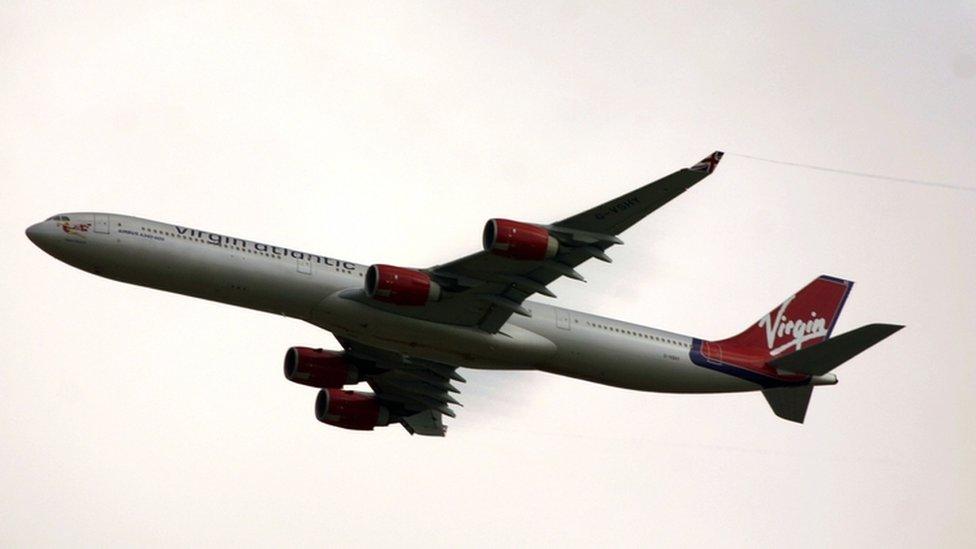
- Published20 October 2015
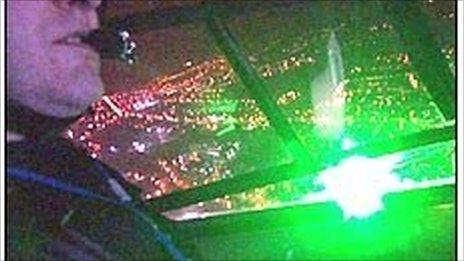
- Published4 June 2014
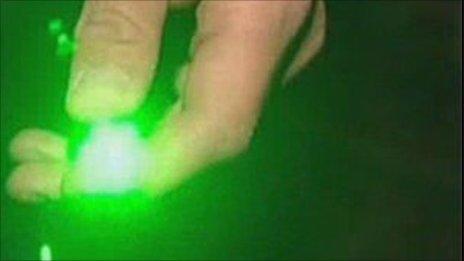
- Published16 April 2014
